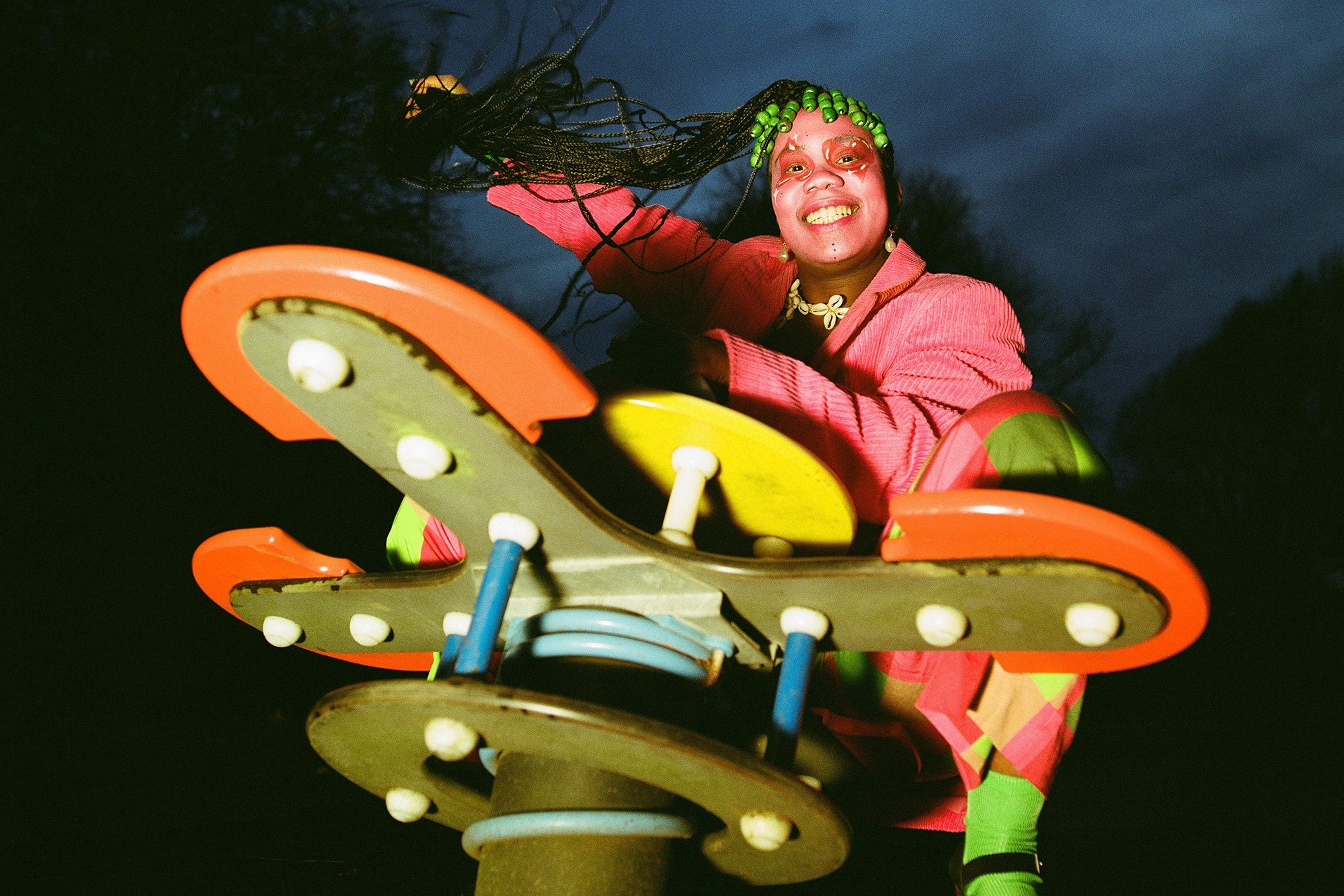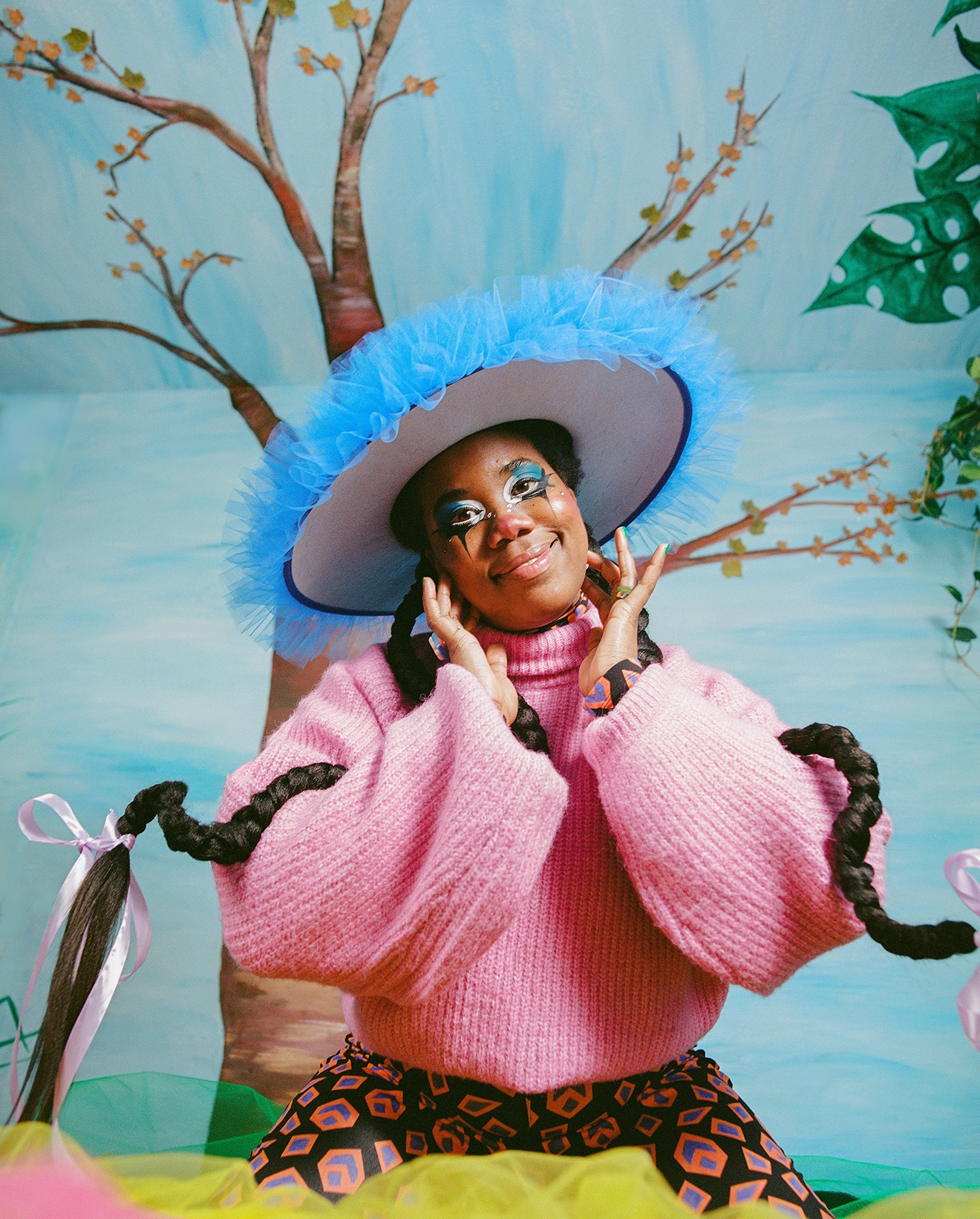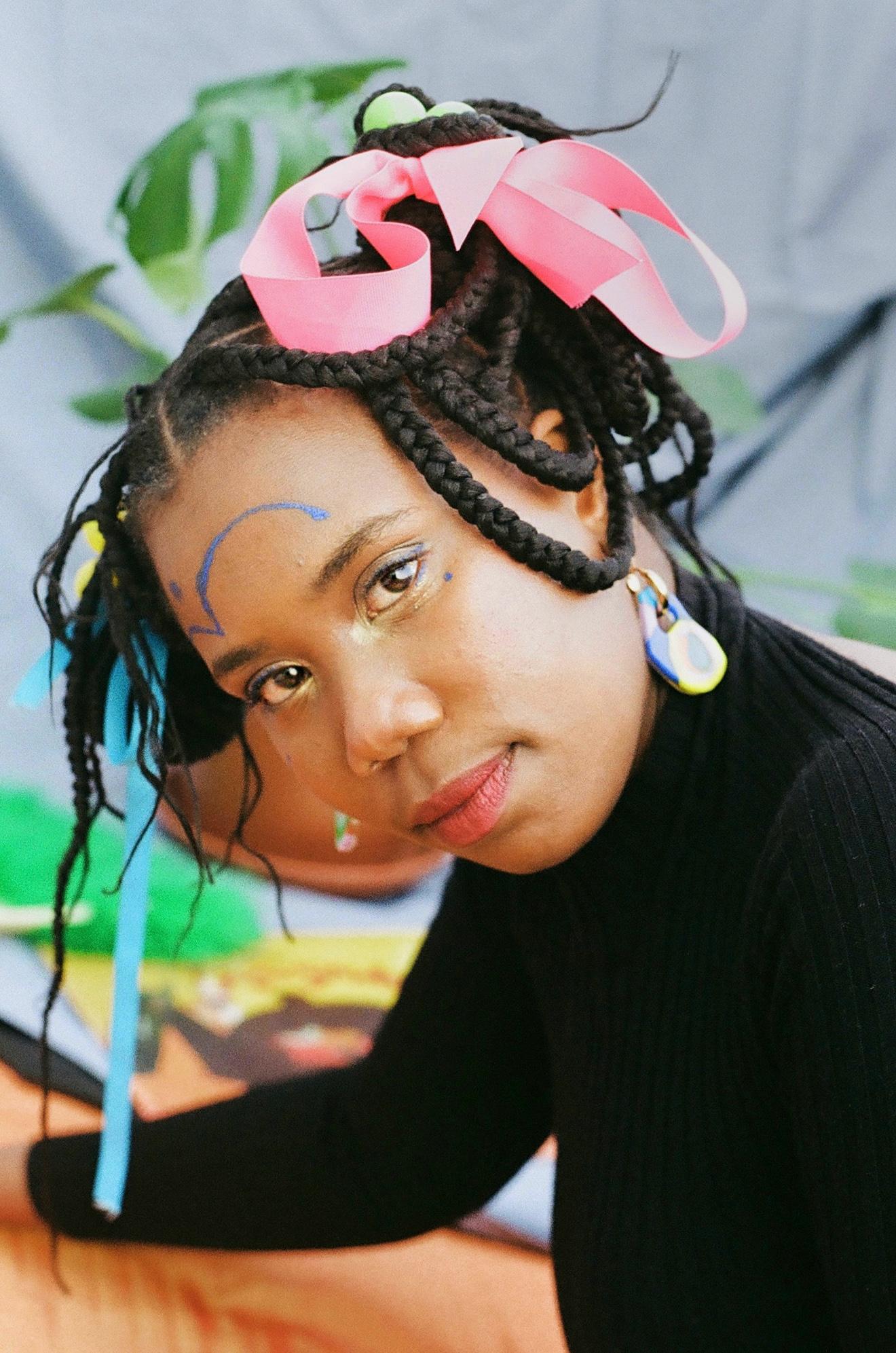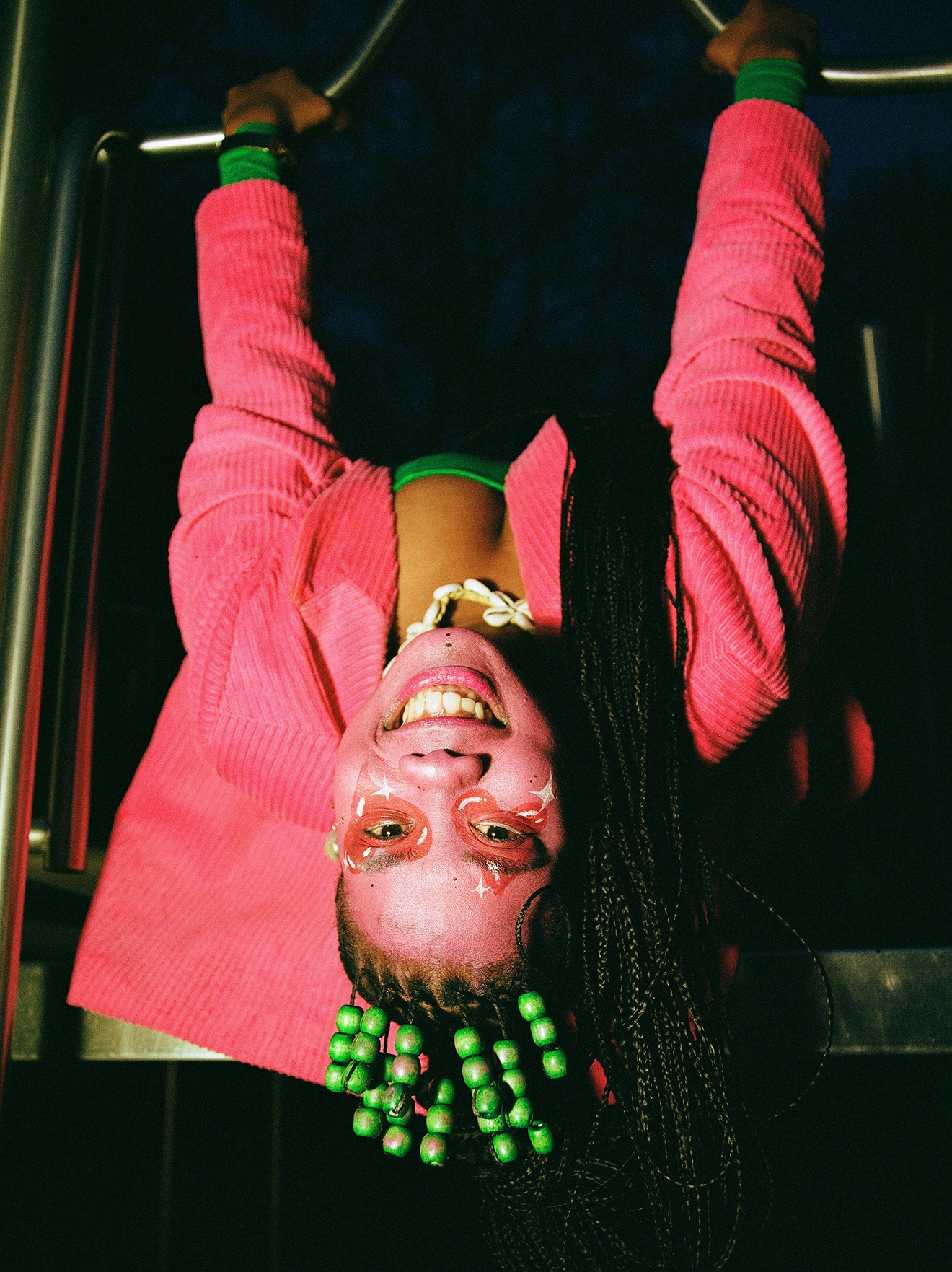 Features
Features
Get to know Gayance, the DJ and producer expressing joyfulness through music
Ahead of the release of her remarkable debut album ‘Mascarade’, Gayance speaks to Martyn Pepperell about growing up in Montreal's Haitian community, the power of intention, and her multidisciplinary creative endeavours
Gayance produces and DJs music that emphasises shared joy, community and cultural connectivity across borders. Since 2013, she’s cultivated an open-hearted sensibility informed by hip hop, R&B, the late 2000s beat scene, London’s broken beat and garage movements, Detroit techno, Chicago house and an equally rich mélange of sunkissed sounds from across Latin America and West Africa.
“For me, it’s the same palette,” Gayance, real name Aïsha C. Vertus, explains by video call from Amsterdam, where she has been living since October 2022. “All these genres re-meeting each other is just the future of Afro-diasporic music coming back together. There’s a new essence, but it’s still the same in some ways. It’s like the ancestors came back, you know?”
Born and raised in Montreal's Haitian community, Aïsha grew up surrounded by music, dance, laughter and family. Casting her mind back, she remembers her late grandfather leading Chorale Feu Nouveau, a Christian choir group that performed Haitian-Cuban-influenced gospel music. In their fusion of soaring voices and syncopated kompa rhythms, Aïsha witnessed how, through intention and delivery, music can serve as a tool to gather and uplift a community. “My grandfather would always tell me there is power in intention,” she says. “Every word you say, you become. So if you have intention in anything, it’s really like magic.”
Read this next: DJ Koze, Lakou Mizik & Joseph Ray on the power of Haitian Vodou music
Aïsha’s mother was a contemporary dance practitioner with a taste for the avant-garde. On the other hand, her father introduced her to blues, soul, psychedelic rock and ‘90s Jamaican dancehall. “When my mum was young, she used to go to [the alternative rock venue] Les Foufounes Électriques and listen to wavy stuff like Art of Noise,” Aïsha says. During her childhood and teenage years, she followed in her footsteps, learning tap dance, ballet and street dance.
When she wasn’t at dance classes or with her parents, Aïsha often spent time with her aunt Sylvie, who would play her Wu-Tang Clan, Erykah Badu, The Fugees and foundational Québec hip hop from the era, or rode around listening to house with her uncles Patrick and JC. “My uncles were club promoters,” she enthuses. “They were booking Daft Punk, Moby, Beanie Man and all this stuff at SONA with Tiga and those guys.”

By age 18, Aïsha was, as she puts it, “Already the one sharing good music with my dancer friends.” Having discovered Montreal’s vibrant nightlife, she’d head out to clubs on St Laurent Blvd to hear DJs like Andy Williams, Scott C, Moonstarr, and The One Tash play a full spectrum of jazz, soul, funk, hip hop, broken beat, garage and Afro-Latin music. “They really put me onto that sound,” she reflects.
Aïsha was also part of a young community of then-nascent Haitian beatmakers, including Kaytranada, Lunice, High Klassified and Shash’U. That year, she travelled to Los Angeles for the first time to attend Daddy Kev’s storied Low End Theory club night, ground zero for the L.A. beats scene. “Listen, it was church,” she proclaims. “It changed my life forever.”
Read this next: The Beat Scene 2.0
At the time, she was a street dance practitioner with Montreal’s respected Urban-Element Zone dance centre, but it was not meant to be. “I had an injury and couldn’t dance anymore,” she explains. While she was recovering, she started studying at film school. “I know how to talk about music and film, so I thought I might be a music journalist. Why not?”
In 2012, Aïsha produced and co-directed a short documentary about the Montreal beats scene titled Piu Piu. The following year, she started her DJ journey as Gayance, which very fittingly is a Haitian Creole term used to express joyfulness. “I was a diehard fan of Flying Lotus,” she remembers. “There was not a set that went by when I didn’t play a song off [his] 'Los Angeles' or '1983' [albums].”
As the years passed, Aïsha began bringing her eclectic and expressive DJ sets to dancefloors across North America, Europe and South America, building community show by show. Over on her Mixcloud page, you can hear her gradual evolution through an archive of DJ mixes and radio shows for channels including n10.as radio, Rinse France, The Lot Radio and Kiosk Radio. She also worked as a freelance journalist for media outlets like Vice, The Fader, Red Bull Music Academy and Noisey France.

In 2020, while the coronavirus pandemic swept the globe, Aïsha realised she’d been on track to become a stereotypical DJ burnout. Like many others, the pandemic forced her to take pause and reassess her situation. “Stop is a hard word for me,” she says. “I don’t like that word, but I had time to learn something, and I already know a lot of languages.”
With French, English, Portuguese and Haitian Creole under her belt, Aïsha decided to devote the enforced downtime to learning a different type of language — electronic music production. After some advice, she settled on Ableton Live. Using controllers and drawing from the nostalgic memories of elementary school piano lessons, she began recording demos and collaborating with friends, culminating in the bossa nova and jazz-infused club sounds of her self-released debut EP, ‘No Toning Down’.
While she was working on ‘No Toning Down’ in 2021, Aïsha had a conversation with an interdisciplinary artist and researcher named Stina Baudin, who encouraged her to apply for an artist residency with the PHI Centre, a Montreal-based multidisciplinary arts and culture organization. She gave it a shot and was shook when they replied to tell her she’d been accepted. “It was crazy,” she reflects.
Read this next: Regularfantasy's lyrical house music will make you dance and sing
In the fall of that year, Aïsha spent two weeks on a creative retreat at the residency with friends at a riverside lodge in picturesque St-Adèle, half an hour's drive from Montreal. “Fall in Canada is my favourite season,” she says. “It’s the oranges, reds and all these colours.” During that fortnight, she made use of an on-site studio to record her remarkable debut album ‘Mascarade’, due for release on March 3 through Bradley Zero’s Rhythm Section International label.
“Making the album was a miracle,” Aïsha enthuses. “The residency was a very particular place to be able to create, and I didn’t have to put myself under pressure to be able to do what I did.” Opting to work in stages, she had small groups of friends come through for several days at a time, beginning with Janette King, a producer, vocalist, multi-instrumentalist and DJ, and the rapper/singer Hua Li.
“I was with Janette and Hua for four days, then for the next four days, I was with other people,” Aïsha remembers. “At the end, I had my M.V.P’s, Émile Farley (bass) and David Ryshpan (keyboards) come through because I had some chords and basslines I wanted to replay. I can play chords, of course, but David can lay the chords.” She pauses for a moment before continuing. “These are people I’ve known for ten years. They’re people that I trust.”

Rendered in sensual melodies and laidback rhythms that effortlessly tie together her love of broken beat, garage, jazzy house, neo-soul, R&B and Latin American music, ‘Mascarade’ is a homage to her younger self during her twenties, or as she puts it, “this kid everybody knew, but not deeply.” In the pure physical pleasure of tracks like ‘Clout Chaser's Anthem’ featuring Janette King & Hua Li and ‘Shore Apart’ featuring Raveen, Aïsha makes peace with the past while opening a new doorway into her future.
“It was also a spiritual experience,” she reflects. During the residency, her friend Rebecca Manankil, a Toronto-based sound healer, guided Aïsha and her friends through a sound bath inside a swimming pool attached to the lodge. “I realised that it was something I needed to do while I was doing this,” she muses. “These were moments of transcendence, you know what I’m saying?”
Where this transcendence comes through the clearest on ‘Mascarade’ is through the shuffling gospel house magic of the album’s final track, ‘Moon Rising (10 Years)’ featuring the explosive jazz vocalist Judith Little D. Inspired by the energy of her grandfather’s choir group, the song sees Aïsha and her collaborators emphasising the euphoria and spiritual feelings that can be found on a late-night dancefloor when everything comes together.
After completing ‘Mascarade’, Aïsha, in her words, “Knocked my head on the corner of a table metaphorically and thought, why don’t we make a short film?” Filmed between Canada and Brazil, Aïsha sees the film as a slice of experimental documentary fiction that expands on themes she explores across the album. ‘It’s like you’re watching a dream, but you can see everything I’m talking about,” she explains.
The trailer will drop on March 3 alongside ‘Mascarade’, but Aisha hasn’t settled on a release date for the film yet. “We’re looking for a distributor,” she says. “With the energy, money and time it took to make it, I think it’s worth making sure it reaches film festivals.” After all, taking her time is how she arrived at this moment. “I like dance, I like films, I like music,” she says, pausing briefly before continuing with a chuckle. “I just like this shit. Soon I’m gonna be acting!”
'Mascarade' is out March 3 through Rhythm Section International. Pre-order it here
Martyn Pepperell is a freelance journalist, follow him on Twitter


